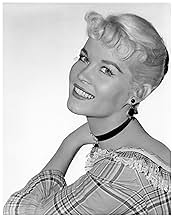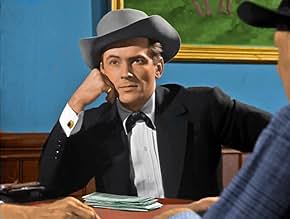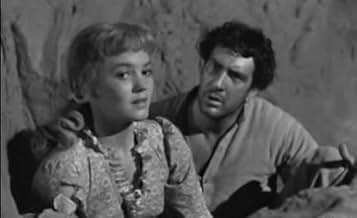El recién graduado abogado Tom Brewster se dirige al Oeste en busca de fortuna. Lamentablemente, sus habilidades de vaquero dejan mucho que desear, ganándose el apodo burlón de "Sugarfoot" -... Leer todoEl recién graduado abogado Tom Brewster se dirige al Oeste en busca de fortuna. Lamentablemente, sus habilidades de vaquero dejan mucho que desear, ganándose el apodo burlón de "Sugarfoot" - un peldaño por debajo de "Tenderfoot".El recién graduado abogado Tom Brewster se dirige al Oeste en busca de fortuna. Lamentablemente, sus habilidades de vaquero dejan mucho que desear, ganándose el apodo burlón de "Sugarfoot" - un peldaño por debajo de "Tenderfoot".
Explorar episodios
Opiniones destacadas
"Sugarfoot" was one of 4 westerns that shared a time slot on the same night. The other shows were "Maverick", "Cheyenne",and "Bronco Lane". So you only got to see each of them once a month. Each had it's own song, and unfortunately, I remember them. They were all different but strangely alike. Sugarfoot was a blond,blue-eyed young man who really went against the "cowboy/hero" type. He was an "aw shucks," type and didn't use his gun as much as other western heroes. Maverick was a smooth talking gambler and was usually funny. Bronco Lane was from Texas and as far as I remember, was his best attribute. Cheyenne was an absolute hunk with broad shoulders, really big chest, and a small waist. Each one of them seemed to just roam around, getting into trouble, rescuing people, and solving crimes. Boy, could we use them nowadays.
For the first time in decades, as far as I know, "Sugarfoot" is being rerun in rotation with "Cheyenne" and "Bronco," just as it did when the show originally aired. "Maverick" is also being rerun in the preceding slot. Of the four, "Maverick" is clearly the superior series, deserving to have won the only Emmy Award in the category of "Best Western." Do not be fooled by the Mel Gibson movie of the same name; in comparison to the original it fails almost as badly to capture the magic of the series as Will Smith's "Wild, Wild West" failed to capture the magic of television's "The Wild, Wild West."
Of the three remaining series, "Cheyenne" and "Bronco" are almost interchangeable, which as I'll explain below, makes sense. "Sugarfoot" stands out because of the protagonist's, Tom Brewster, aversion to carrying a gun and his lackadaisical desire to avoid trouble; "Sugarfoot" is "Destry Rides Again" brought to television unfortunately without James Stewart. Will Hutchins isn't bad in the role, but he just isn't dynamic enough, in my opinion, to carry what essentially is an anthology series, the location and supporting cast changing with every episode. Had Warner Bros. allowed Brewster to have stayed in one place and cultivated a supporting cast around him, the show could have easily lasted longer than four seasons.
Regarding the earlier post's statement of how "Sugarfoot," "Maverick," et al. originally aired, here's the correct version (all of the on the U.S. network, ABC):
1955-1956: "Cheyenne" premieres on Tuesday at 7:30 (EST) (and where it will stay until 1959) as one of three series in rotation under the umbrella title, "Warner Bros. Presents." The other series were "King's Row" and "Casablanca"; all three were based on earlier Warner films. "Cheyenne" was the most popular and avoided the cancellation the other two received at season's end.
1956-1957: "Cheyenne" runs in rotation with "Conflict." This new show was a true anthology, with cast and setting different each episode. It was canceled at the end of the season.
1957-1958: "Sugarfoot" premieres in rotation with "Cheyenne."
"Maverick" premieres on Sunday at 7:30 (EST). After a few episodes, production of "Maverick" fell behind schedule; it took eight days to produce an episode when, I believe, each was supposed to take six. Westerns just took longer to produce which is why "Cheyenne" ran in rotation in the first place. To compensate for the slow delivery of "Maverick" episodes, a new character, Bret Maverick's brother, Bart, was added and episodes centering on him were rotated with Bret episodes.
1958-1959: "Cheyenne"/"Sugarfoot" in rotation on Tuesday, "Maverick" continues on Sunday. Maverick will win the "Best Western Series" for this season of shows.
There is a big change regarding "Cheyenne" this season. The star, Clint Walker, refused to work because of the unfavorable terms of his contract, which among other things required Warner to pay him only scale, while Walker was required to give Warner 50 percent of all personal-appearance fees he received. Warner was not ready to give up a hit series and replaced Walker with Ty Hardin, who played Bronco Layne, who was essentially the Cheyenne character with a different name.
1959-1960: Walker returns and "Cheyenne" moves to Monday at 7:30 (EST) where it rotates with "Shirley Temple's Storybook."
Hardin is rewarded for being a team player and stars in "Bronco," which rotates with "Sugarfoot" in the Tuesday at 7:30 slot.
"Maverick" remains on at 7:30 on Sunday.
1960-1961 "Cheyenne" is joined by "Sugarfoot" and "Bronco" at 7:30 on Mondays. However, now instead of each being individual series, all are listed under the umbrella title of "Cheyenne." If you watch any of these programs in syndication, you can tell when the "Cheyenne" umbrella starts: Rather than each having an individualized end card over which the credits ran, there is a unifying one showing full figure silhouettes of the three leads sitting on horses. "Sugarfoot" is canceled at the end of the season.
"Maverick" continues Sunday at 7:30. However, James Garner, Bret Maverick, refused to work for the reasons Clint Walker had a few seasons earlier, but unlike Walker, Garner didn't return (though he would return to the character in 1978 and 1981). Jack Kelly, playing Bart, did stay as replacements for Bret were tried, including Roger Moore as cousin Beau and Robert Colbert (who resembled Garner from a distance) as never-before-mentioned brother Brent.
1961-1962 "Cheyenne"/"Bronco" at Monday, 7:30. (End card altered to reflect just the two programs.)
"Maverick" remains on Sunday, but airs an hour earlier at 6:30 (EST). A handful of new Bart episodes aired along with reruns of episodes featuring Bart or Bart & Bret. The show was canceled at the end of the season.
1962: "Cheyenne" returns alone for the fall and then is canceled in December.
Of the three remaining series, "Cheyenne" and "Bronco" are almost interchangeable, which as I'll explain below, makes sense. "Sugarfoot" stands out because of the protagonist's, Tom Brewster, aversion to carrying a gun and his lackadaisical desire to avoid trouble; "Sugarfoot" is "Destry Rides Again" brought to television unfortunately without James Stewart. Will Hutchins isn't bad in the role, but he just isn't dynamic enough, in my opinion, to carry what essentially is an anthology series, the location and supporting cast changing with every episode. Had Warner Bros. allowed Brewster to have stayed in one place and cultivated a supporting cast around him, the show could have easily lasted longer than four seasons.
Regarding the earlier post's statement of how "Sugarfoot," "Maverick," et al. originally aired, here's the correct version (all of the on the U.S. network, ABC):
1955-1956: "Cheyenne" premieres on Tuesday at 7:30 (EST) (and where it will stay until 1959) as one of three series in rotation under the umbrella title, "Warner Bros. Presents." The other series were "King's Row" and "Casablanca"; all three were based on earlier Warner films. "Cheyenne" was the most popular and avoided the cancellation the other two received at season's end.
1956-1957: "Cheyenne" runs in rotation with "Conflict." This new show was a true anthology, with cast and setting different each episode. It was canceled at the end of the season.
1957-1958: "Sugarfoot" premieres in rotation with "Cheyenne."
"Maverick" premieres on Sunday at 7:30 (EST). After a few episodes, production of "Maverick" fell behind schedule; it took eight days to produce an episode when, I believe, each was supposed to take six. Westerns just took longer to produce which is why "Cheyenne" ran in rotation in the first place. To compensate for the slow delivery of "Maverick" episodes, a new character, Bret Maverick's brother, Bart, was added and episodes centering on him were rotated with Bret episodes.
1958-1959: "Cheyenne"/"Sugarfoot" in rotation on Tuesday, "Maverick" continues on Sunday. Maverick will win the "Best Western Series" for this season of shows.
There is a big change regarding "Cheyenne" this season. The star, Clint Walker, refused to work because of the unfavorable terms of his contract, which among other things required Warner to pay him only scale, while Walker was required to give Warner 50 percent of all personal-appearance fees he received. Warner was not ready to give up a hit series and replaced Walker with Ty Hardin, who played Bronco Layne, who was essentially the Cheyenne character with a different name.
1959-1960: Walker returns and "Cheyenne" moves to Monday at 7:30 (EST) where it rotates with "Shirley Temple's Storybook."
Hardin is rewarded for being a team player and stars in "Bronco," which rotates with "Sugarfoot" in the Tuesday at 7:30 slot.
"Maverick" remains on at 7:30 on Sunday.
1960-1961 "Cheyenne" is joined by "Sugarfoot" and "Bronco" at 7:30 on Mondays. However, now instead of each being individual series, all are listed under the umbrella title of "Cheyenne." If you watch any of these programs in syndication, you can tell when the "Cheyenne" umbrella starts: Rather than each having an individualized end card over which the credits ran, there is a unifying one showing full figure silhouettes of the three leads sitting on horses. "Sugarfoot" is canceled at the end of the season.
"Maverick" continues Sunday at 7:30. However, James Garner, Bret Maverick, refused to work for the reasons Clint Walker had a few seasons earlier, but unlike Walker, Garner didn't return (though he would return to the character in 1978 and 1981). Jack Kelly, playing Bart, did stay as replacements for Bret were tried, including Roger Moore as cousin Beau and Robert Colbert (who resembled Garner from a distance) as never-before-mentioned brother Brent.
1961-1962 "Cheyenne"/"Bronco" at Monday, 7:30. (End card altered to reflect just the two programs.)
"Maverick" remains on Sunday, but airs an hour earlier at 6:30 (EST). A handful of new Bart episodes aired along with reruns of episodes featuring Bart or Bart & Bret. The show was canceled at the end of the season.
1962: "Cheyenne" returns alone for the fall and then is canceled in December.
In some ways the weakest hero on the WB stable, Tom Brewster roamed the West with an "aw shucks" young Jimmy Stewart attitude "and a rifle and a volume of the law". As a youngster, he was my least favoured Western hero, perhaps because he seemed too much the boy next door, too much like a weakling. Will Hutchins did an excellent job in the role, and often the writing was a notch above the other WB Westerns, but there was nothing heroic about the nice guy Tom. There was little heroic about Bret Maverick either but that was a very different matter. And that leads to the problem: Sugarfoot was just too young. Nick Adams may have been young but he was "The Rebel". Tom Brewster: too young, too neutered. Too bad. Not a bad theme song though.
When the television series Sugarfoot was winding down its four year run I remember that The Man Who Shot Liberty Valance had a way too old James Stewart playing a young attorney who came out west to seek fame and fortune as per Horace Greeley. Will Hutchins as Tom Brewster was more the age of the character that Stewart did.
And Brewster came to us once a month sharing viewing time with Cheyenne, Bronco, and Maverick. You have to remember that the stars of all these TV westerns were aspirant film stars as well and Warner Brothers was going to get maximum use out of them. And of course James Garner from Maverick had the biggest success on the big screen.
Hutchins was a nice peaceable sort of young man in the Wild Bill Elliott tradition. He may have started a greenhorn in the west, a Sugarfoot so to speak, but he learned to handle a Colt .45 with reasonable skill as I recall.
Sugarfoot came at the height of TV westerns, we'll never see these kinds of shows again, I fear.
And Brewster came to us once a month sharing viewing time with Cheyenne, Bronco, and Maverick. You have to remember that the stars of all these TV westerns were aspirant film stars as well and Warner Brothers was going to get maximum use out of them. And of course James Garner from Maverick had the biggest success on the big screen.
Hutchins was a nice peaceable sort of young man in the Wild Bill Elliott tradition. He may have started a greenhorn in the west, a Sugarfoot so to speak, but he learned to handle a Colt .45 with reasonable skill as I recall.
Sugarfoot came at the height of TV westerns, we'll never see these kinds of shows again, I fear.
in this day and age when you hear of stars being snooty, I am pleased to report that both Will Hutchins and Clint Walker are two very nice, unpretentious people. Years ago I wrote Will Hutchins C/o NBC where he was working and what I got back was a very nice, personal hand written letter that answered all my questions I asked him, no form letter. Through a friend I got Clint Walkers e-mail and have corresponded with him off and on for two years...he is a gentleman and very nice person. Too bad all the stars are not like these two. How many of you have written stars and gotten back a form letter that said simply "Thank you for writing" or worse no answer at all? These two men know who they owe their fame too-the public, fans like us.
¿Sabías que…?
- TriviaWill Hutchins' horse during this TV series' first season was named "Sickle". He and the horse never "got along" and did not like each other, resulting in problems when his character, Tom Brewster, needed to be photographed either sitting on or riding his horse. For its second season Hutchins was given a horse named "Penny", with which was much easier for him to get along with and gave him no trouble; as he said regarding Penny, "It was love at first sight."
- ConexionesFeatured in TV's Western Heroes (1993)
Selecciones populares
Inicia sesión para calificar y agrega a la lista de videos para obtener recomendaciones personalizadas
- How many seasons does Sugarfoot have?Con tecnología de Alexa
Detalles
- Tiempo de ejecución1 hora
- Color
- Relación de aspecto
- 1.33 : 1
Contribuir a esta página
Sugiere una edición o agrega el contenido que falta

Principales brechas de datos
By what name was Sugarfoot (1957) officially released in India in English?
Responda



































